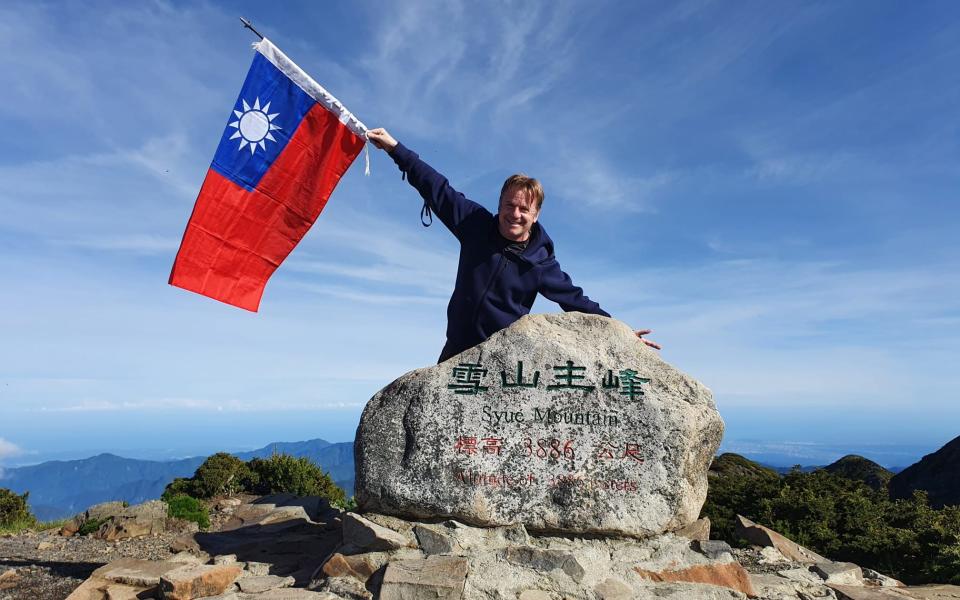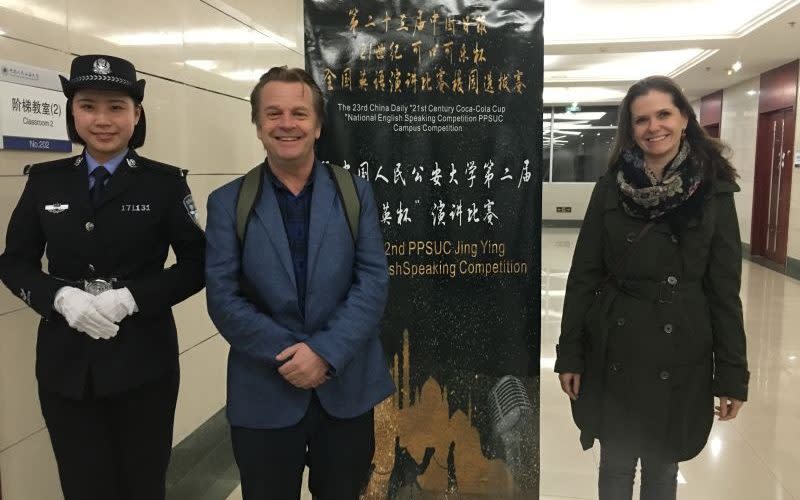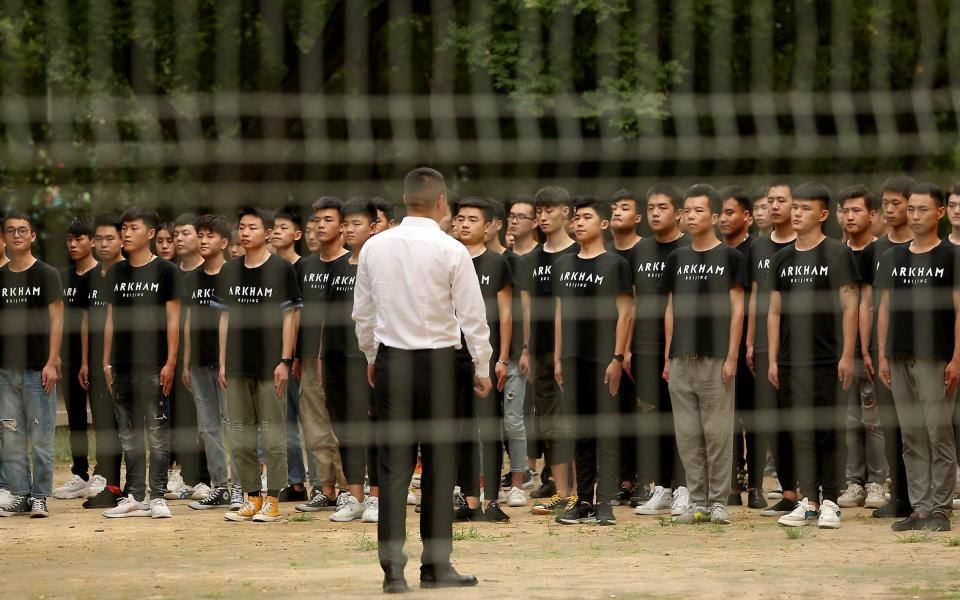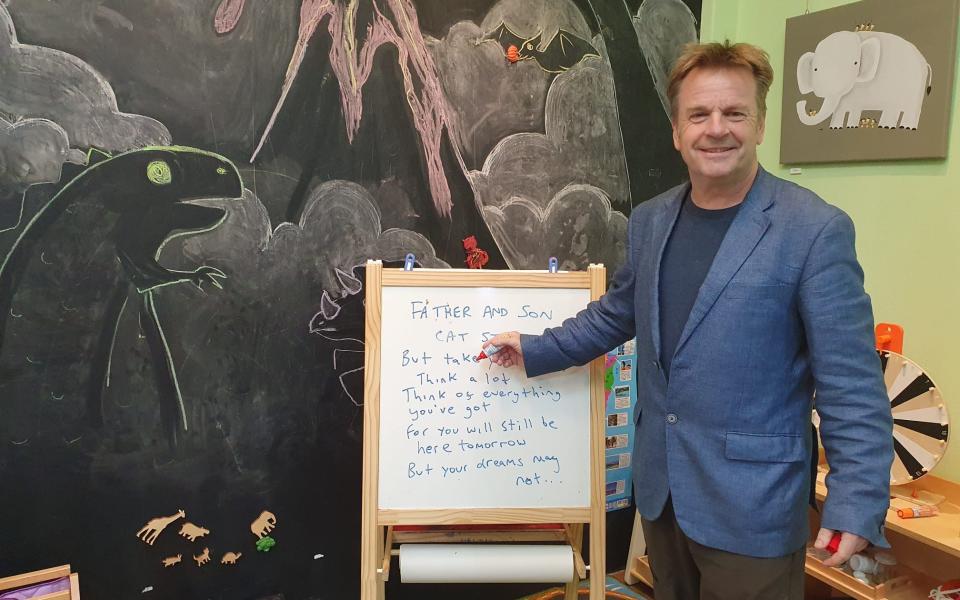I taught China’s police cadets as Xi’s grip took hold – I hope they never meet my students in Taiwan

- Oops!Something went wrong.Please try again later.
It’s still so easy to remember them, their eager teenage faces and smart uniforms, their distinctive, often comical English names – Athena, Gigi and Roxy for the girls, Zeus, Wolf and Tony Stark for the boys.
These were my Chinese students at the catchily titled People’s Public Security University of China (PPSUC) in Beijing, a training nerve centre for top police cadets – mostly men, with around 15 per cent women – recruited countrywide from Shanghai to Shangri-La.
If, heaven forbid, President Xi Jinping ever succeeds in following through his threat to ‘take back’ Taiwan, some of my graduates, especially those specialising in international affairs, might end up policing my new home.
China’s rampant militarisation is no secret. What was once restricted to the parade ground has now shifted to classrooms, with revised state laws now pushing for mandatory military service for high school pupils, drills for 12- to 15-year-olds and even some defence education for primary school kids.
As patriotic cadets, some of my students were convinced Taiwan would one day come under Chinese control (the democratic island has never, in fact, been part of the People’s Republic of China) and would be proud to police there, while most were less gung-ho in their global ambitions, hoping to simply serve their home states.

They saw an invasion of Taiwan as unlikely and a more piecemeal, long-term approach holding sway, perhaps involving a naval blockade, or trade embargos or (said off record by a rare Xi-sceptic) ‘serious hacking’. Or all, or maybe, none, of the above.
Even during my year in Beijing (where I hoped to master Mandarin), it was clear nationalism was on the rise. Most of my students (I ran classes with up to 50 in each) were friendly and attentive, but a few were openly hostile to the idea of a Western teacher.
My sparky American colleague, Ellie, and I, were something of a rarity, the first foreign English teachers at PPSUC, founded in 1948, in many years.
One particular scowling huddle of students, who always sat at the back, would report me whenever I said anything that might shake their view of China as a progressive Utopia with God-like President Xi at the helm.
Arrestingly, I once held a class where I asked students which other countries they’d most like to visit. Many talked animatedly of America, Australia and parts of Europe but the Xi purists just barked out: “China!”
When I stressed it’s a big world out there, lots to see, they reiterated: “China, teacher, CHINA!” This was the extent of their global reach.

But there were fun times, too. One class I took centred on satire, and how in the West we could poke fun at our leaders. I showed a photo of Donald Trump with a florescent orange face, Boris Johnson with wild, rook’s nest hair, and even the Queen, who I emphasised was admired by most of us Brits, affectionately portrayed in a Del Boy Trotter coat with a ciggie and a glass of fizz.
The only photo I could find satirising President Xi (that I felt I could get away with) was him giving one of his three-hour-plus, Nero-like speeches to congress. Looking on was China’s ex-leader, Jiang Zemin (93 at the time) yawning so wide you could fit a grapefruit in his mouth.
Most of my students laughed cautiously at this but the Xi fanboys reported me to higher powers. They’d done the same when I mentioned that Hong Kong was once a British colony and when I noted that, though the Dalai Lama was seen as a subversive figure in China, he was respected by many Westerners, including me.
I did not say this to stir things up (well, maybe a little), just to make clear that, as elite cops dealing with foreigners, this would be useful intel.

On the plus side, the few times I was reported, my bosses were amused rather than angry. I respected that certain topics were off limits (Tiananmen Square, anyone?) but there was little point in having foreign English teachers if we taught exactly the same ‘China No 1’ stuff as our local counterparts.
The senior professors got this. Indeed, the university staff couldn’t have been kinder. Ellie and I were housed in free, roomy apartments in the admittedly rather austere grounds; were fed healthy, no-nonsense tucker at the staff canteen; paid a decent salary for China (about £15,000 per year) and even taken on weekend hiking trips, where our fellow teachers would challenge us to drinking games with baijiu, a sorghum (with notes of anti-freeze) wine, designed to melt away social jitters, language gaffs and much of your stomach lining.
In Beijing, the phone was king. WeChat, China’s version of WhatsApp, was the main form of communication between teachers. Indeed, all global social media – Facebook, Instagram, X – is banned, replaced by local substitutes, though rule-dodging VPNs often skirted this problem.
Ellie and I received our instructions and our salaries via phone. All purchases at shops and eateries in Beijing, bar the most local street markets, were done with a barcode swipe. We had a lot of laughs.

On the very first day, our induction, Ellie taught me, a cack-handed 50-something battling with new tech, how to send a variety of emojis. That morning, as we were shown around, my phone sent a flurry of hugely inappropriate pocket emojis – kisses, hearts, unicorns and a bucking donkey – to our new boss.
“I’ll pack my bags,” I told Ellie, as she hooted with mirth, scrolling through my rainbow-heavy messages. “I’m toast,” I shrugged, “and it’s only Monday morning.”
In the end, it turned out our new boss found the whole episode equally hilarious. “I thought you English were so reserved, Tom,” she said, head askance. “How wrong I was!”
Less entertaining was the speech contest Ellie and I were asked to judge. Never have I had a more dispiriting afternoon – and I’m a Sheffield Wednesday fan. It was grim seeing over two hundred of my students, normally so bubbly and cheeky, earnestly spout the same old “make China great again” guff about Xi Jinping’s ‘world beating’ Belt and Road Initiative in a venue so bleakly beige even Martin Luther King at full throttle would struggle to inspire.
This was small beer, though, compared to what was going on outside of the university. When I arrived in China in 2016, I was hopeful it was becoming a positive player on the world stage.

The 2008 Olympics had been a roaring success (if choreographed to within an inch of its life) and China was now taking part in global conferences on everything from health to climate change. Most of all, in the broader sweep of history, China had managed over the last half century to free millions from extreme poverty.
Yet, Xi Jinping, when he took power in 2013, despite having a famous folk singer wife and a Harvard-educated daughter, soon made it clear he favoured a tight, ‘screw world opinion’ authoritarian agenda.
During my time in Beijing, in early 2018, the Chinese Communist Party (CCP) boosted Xi’s term of office in a far-from-nail-biting vote, that he won by 2964 votes in favour, with 2 against, (oh, that brave pair!), to make himself President for Life.
It was becoming clear Xi saw himself as Chairman Mao reborn, and this, despite the fact Xi’s father had been dubbed a traitor and suffered a spectacular fall from grace during Mao’s rule.
“In China we have just one time zone,” a Xi-sceptic Chinese friend said to me one evening, after one too many baijiu. “Here, our clocks have the same time from Hong Kong to the Himalayas.”
He primped his wispy Confucius moustache. “Russia has 11 time zones. Imagine!” he hissed. “Xi likes control even more than Putin!”

Near the end of my PPSUC stint, it transpired that Xi had become vexed by internet wags comparing him to Winnie the Pooh – so much so that a film about Pooh’s creator, A.A. Milne, called Goodbye Christopher Robin, which I’d been looking forward to seeing in Beijing, was banned.
China only accepts a quota of 30-odd foreign films a year, mostly goofy comedies and smash-bang action stuff, never anything controversial. Poor old Pooh, that portly, insurgent, honey-addicted rabble rouser didn’t cut it. Watch out Paddington, I thought, you’ll be next!
As for China’s own movies, gone were the exquisite art house films of the late 90s and early noughties, often directed by Beijing Olympic ceremony mastermind, Zhang Yimou, and starring his luminous muse, Gong Li. Now, these masterpieces of beauty and pathos have largely been eclipsed by violent, nationalist Wolf Warrior fare, which make Rambo look like, well, Winnie the Pooh.
With clampdowns on free speech in Hong Kong and the growing persecution of minorities, most starkly the Uyghur people in Xinjiang Province, in the north west of the country, Ellie and I started to worry Xi was steering his brave new dragon in a sinister direction.
Despite enjoying my time at PPSUC, I knew I would not stay a second year. I was fond of my students, my colleagues and the Chinese people as a whole – but Xi and his bully boys in Beijing were changing the China I once loved (right back to when I cycled across the country in my youth) and turning it into their own dictatorial fiefdom.
In the end, I left early for unexpected reasons after my father became ill. My bosses were once again kind, sympathetic that I needed to break the tail-end of my contract to be with my family. After Dad died a few months later, I looked at the map. My eyes fell on Taiwan.

Another place I’d loved when I’d briefly visited while living and working in Hong Kong in my 20s – and by all accounts still a thriving democracy. I trawled the English teaching jobs pages. Loads, spoilt for choice.
So, here I am, several years later, with no plans to leave and teaching in a country where my students can talk about anything they wish. Tibet, Tiananmen – even Tigger (to be fair, Pooh is no longer banned across China) with no repercussions.
I love my life in Taiwan and am very fond of my students here. I was very fond of my students in China, too. Yet, if I’m honest, I very much hope that my Taiwanese students and Chinese students never meet.
Well, at least not until the day, likely far in the future, they can both peacefully raise a glass of baijiu to this little island’s independence.
A futile hope perhaps, but, as Hemingway once wrote about another turbulent and complex relationship: “Isn’t it pretty to think so?”

